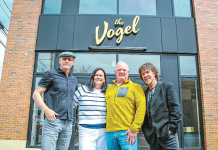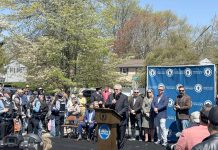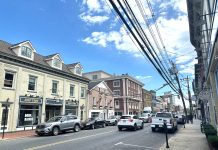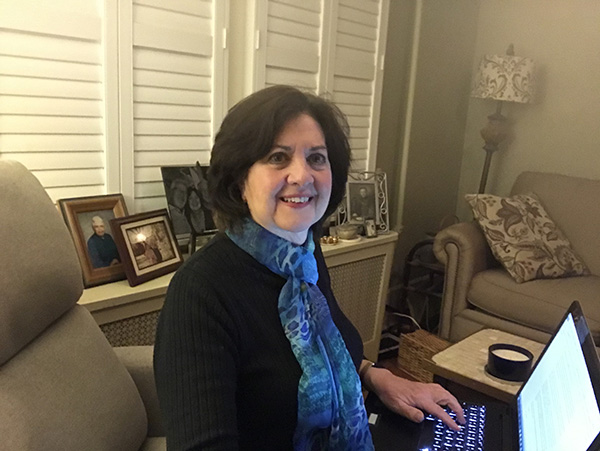
By Eileen Moon
As we move from day to day through the long shadows cast by COVID-19, there’s no question that we are living history.
Whether we are ill ourselves, know someone who is or are simply mapping a new geography marked by empty streets, closed businesses, churches and schools, the Monmouth County Historical Association wants to know what you’re experiencing.
The MCHA is working to compile a historical record assembled in real time, from Monmouth County residents who are living through this time of worry and isolation, each in their own way.
“As soon as this happened and it became clear that life was going to be different, that this was a historic moment, we talked about how we could collect these stories,” said Meg Walton, executive director of MCHA.
“Our goal was to begin first-person documentation as soon as possible to record the initial reactions early on,” said MCHA research librarian Dana Howell. “It will be interesting to look back on even six months from now to see if we were at all accurate.”
“This is the time we really collect these stories; contemporaneous collections,” Walton said. “We decided to reach out to everyone in Monmouth County and invite them to participate.”
Issuing a call for “citizen historians,” Walton and her staff developed a questionnaire for adults and another for children asking about their experiences during the pandemic. The form is posted on the association’s website.
The survey asks respondents a series of questions that include how they felt when the first coronavirus case was identified in the U.S., what personal impacts they have experienced due to the pandemic and what words of wisdom they might share with someone going through a comparable crisis. Responses began coming in almost as soon as the call was posted.
“The response has been pretty good so far,” Walton said. “The responses range from, ‘I’m very lonely’ to ‘I had to close my business and now my life savings is tanking.’ Those were just in the first 24 hours,” Walton said.
The children’s form asks for their thoughts on schools being closed, advice for others on protecting themselves from germs and invites kids to draw a picture of the virus.
“The child’s form is a way to get kids involved in this in a positive way,” Walton said. “It’s empowering them to keep informed.” Children who want to participate are required to have their parent’s permission via a form that parents can fill out online.
For both kids and adults, submitting drawings, journal entries and photographs is encouraged.
“We don’t have a very large archival collection from 9/11, so it was really important that we do this immediately, rather than miss that opportunity, when things are fresh,” Walton said.
Jan Connolly of Neptune City, who was working as a freelance writer and marketing consultant while hunting for a new full-time position, filled out the questionnaire March 17.
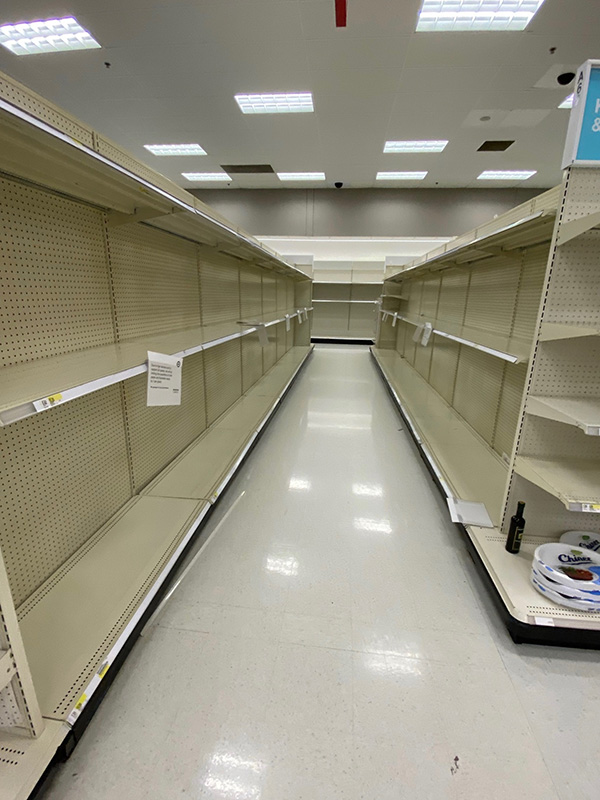
There were empty shelves at the Freehold Target store a few weeks ago, after shoppers stocked up on supplies in response to the COVID-19 pandemic.
She also submitted a photo of empty shelves at a Target store in Freehold and wrote about her worries over finding a new job before her unemployment insurance expired and losing her life savings in the stock market slump.
“It’s very scary having no money coming in and watching your life savings disappear as the stock market craters,” she wrote.
Fortunately, for Connolly, she was hired by a major hospital chain a few days after submitting her responses.
She also chronicled some of the behavior changes she had observed among locals.
“In the early days of the crisis, there were jokes and cavalier shrugs of indifference,” she wrote. “That was soon replaced by ‘pack mentality’ with frenzied runs on supermarkets and hoarding of disinfectants, paper products and food.”
She also noted the new vocabulary circulating during the pandemic: “social distancing,” “self-quarantine,” “work from home,” and “shelter in place.”
The collection will eventually be available to the public in a digital database as part of the oral history archive that Howell and associate curator Joe Zemla are working on.
The oral history project aims to broaden the historical association’s reach through recording the stories of minority residents of the county including African Americans and members of the LGBTQ community.
Although the MCHA is closed as a result of the pandemic, the Remembering COVID-19 project is accessible on its website, where the work of history is continuing.
To participate in the project, access the questionnaires online at monmouthhistory.org/covid19.
This article originally appeared in the April 2nd, 2020 print edition of The Two River Times.



